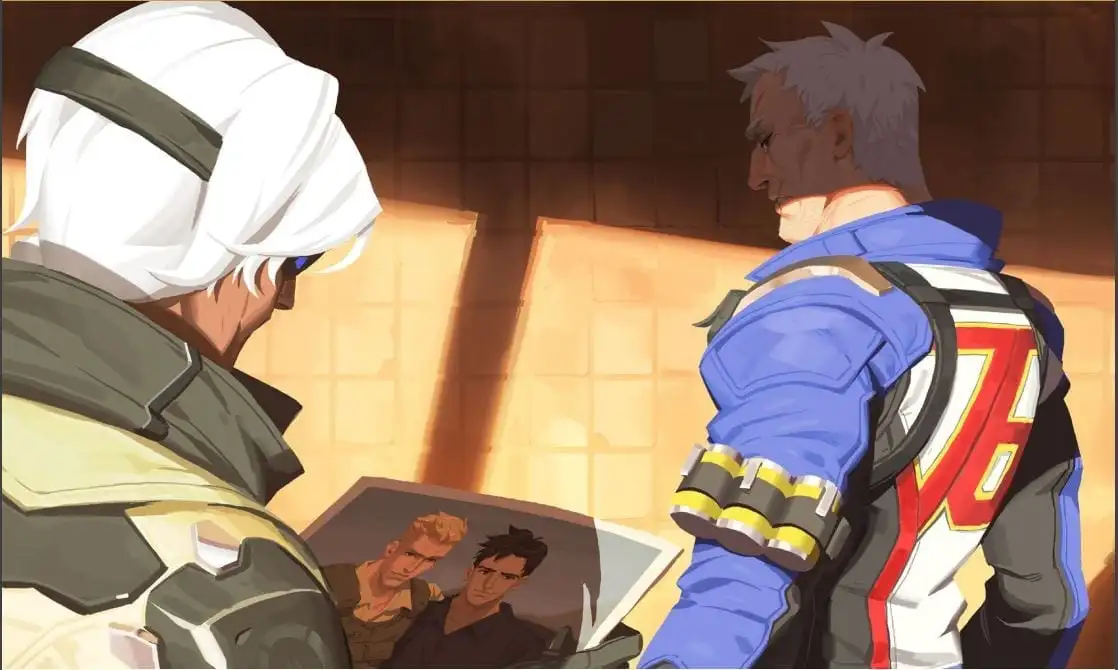When you think of a soldier, what do you picture? Do you see a brave man fighting for his country, yearning for his family back home? Maybe you are seeing a man hiding in the bushes, waiting for the enemy to emerge. There are hundreds of protagonists gamers might conjure: the hulking tank Marcus Fenix in Gears of War, the quiet tactical power of Halo’s Master Chief, or the chaotic insanity of Doomguy in the games that bears his name. Some are blank slates, while others are nuanced portraits of the human condition.
Then there is Soldier: 76 from Overwatch.
Born John Francis “Jack” Morrison, Soldier: 76 is every cliche of a shooter protagonist rolled into one. He was a farm boy from small town America who joined the army and quickly rose in the ranks because of his grit. Late in his military career, he was drafted into the Soldier Enhancement Program and turned into a supersoldier. If you were to throw him a shield, it would just be Captain America grumbling “We’re all soldiers now” at the beginning of every Overwatch match. He was an archetype we’ve seen many times before.
He was boring, particularly compared to the rest of Overwatch’s diverse cast of vibrant characters. This is the game that has a turret-building dwarf, a nature-loving robot, and a genius gorilla as playable characters. Soldier: 76’s generic characterization sticks out like a sore thumb, and everyone knew it, including Blizzard. They knew that Soldier: 76 could be better, so they released the short story “Bastet” to try to improve him.

This was coming off the heels of the controversy around “Ellie,” a male professional Overwatch player who was pretending to be female for a “social experiment.” First gamers accused Ellie of not actually playing, an example of harassment that is all too common in the community. Many called out these toxic elements in the community, but once Ellie was revealed to be fake almost everyone was angry. Blizzard couldn’t win. The release of “Bastet” would be seen by many as a purposeful distraction, the actions of a company solely trying to appease its fanbase in the wake of a scandal. Blizzard likely had the short story in the pipeline before the news broke, but needed to thread the needle to come out on top given that the story’s subject matter could prove controversial for a community that’s very resistant to change.
“Bastet” centers on the cyborg sniper Ana and Soldier: 76 meeting each other during a mission. When Soldier: 76 is injured fighting, Ana takes him back to her hideout to heal his wounds. He comes to, and begins looking at photos from his past including a picture of his young self with a dark haired man who Ana recognizes.
“Vincent. Vincent … I haven’t thought about him in years,” Ana said. “Still keeping a candle lit for him?” Jack shook his head. “Nothing like that.”
Then the short story continues on like nothing happened, because to the characters, nothing had. The fact that Soldier: 76 had a boyfriend when he was young was known to both characters, and didn’t need further explanation. It didn’t need to be a giant revelation that changed everything we knew about the character, because the way we understand him remains the same. The story was just revealing depth that was already there.

Writers will often make a pointed reveal out of a character’s LGBTQ identity, which can come off as awkward. J. K. Rowling remains the best example of this problem, adding representation left and right in her universe, a clumsy approach that has caused fans to react with collective apathy at best and angry backlash at worst. When she revealed that Dumbledore was gay, it felt tacked on and like she was only doing it for internet brownie points. Dumbledore’s sexuality was never really a part of his character, so this revelation didn’t add anything to the story.
However, Soldier: 76 feels different. On the surface the revelation is “tacked on” as Dumbledore’s was, but the nature of Soldier: 76 makes it more compelling. Soldier: 76 is an archetype. He’s a dark, gritty, and emotionally repressed man fighting because it’s the only thing he knows. You have seen this character before, but there’s an assumption we usually make about him without thinking about it: We assume he’s straight.
We live in a world that tells us to assume that any tough guy is straight, that stoicism and emotional repression are inherently heterosexual traits. By framing Soldier: 76’s sexuality as something not at odds with his character, “Bastet” made me question why I made this assumption in the first place. I wondered how I can improve my perspective so such a mistake doesn’t happen again.
When I asked you to think of a soldier I would be willing to wager that you thought of a straight person. Why did you jump to that conclusion? What is inherently straight about military service? How has this assumption damaged us in the past?
That’s why Soldier: 76’s story is so valuable. It’s meant to make us question our own assumptions and look at ourselves in the mirror. The best art makes us introspective, and this seemingly disposable piece of worldbuilding for a multiplayer shooter managed to do just that.





Published: Jan 18, 2019 09:00 am